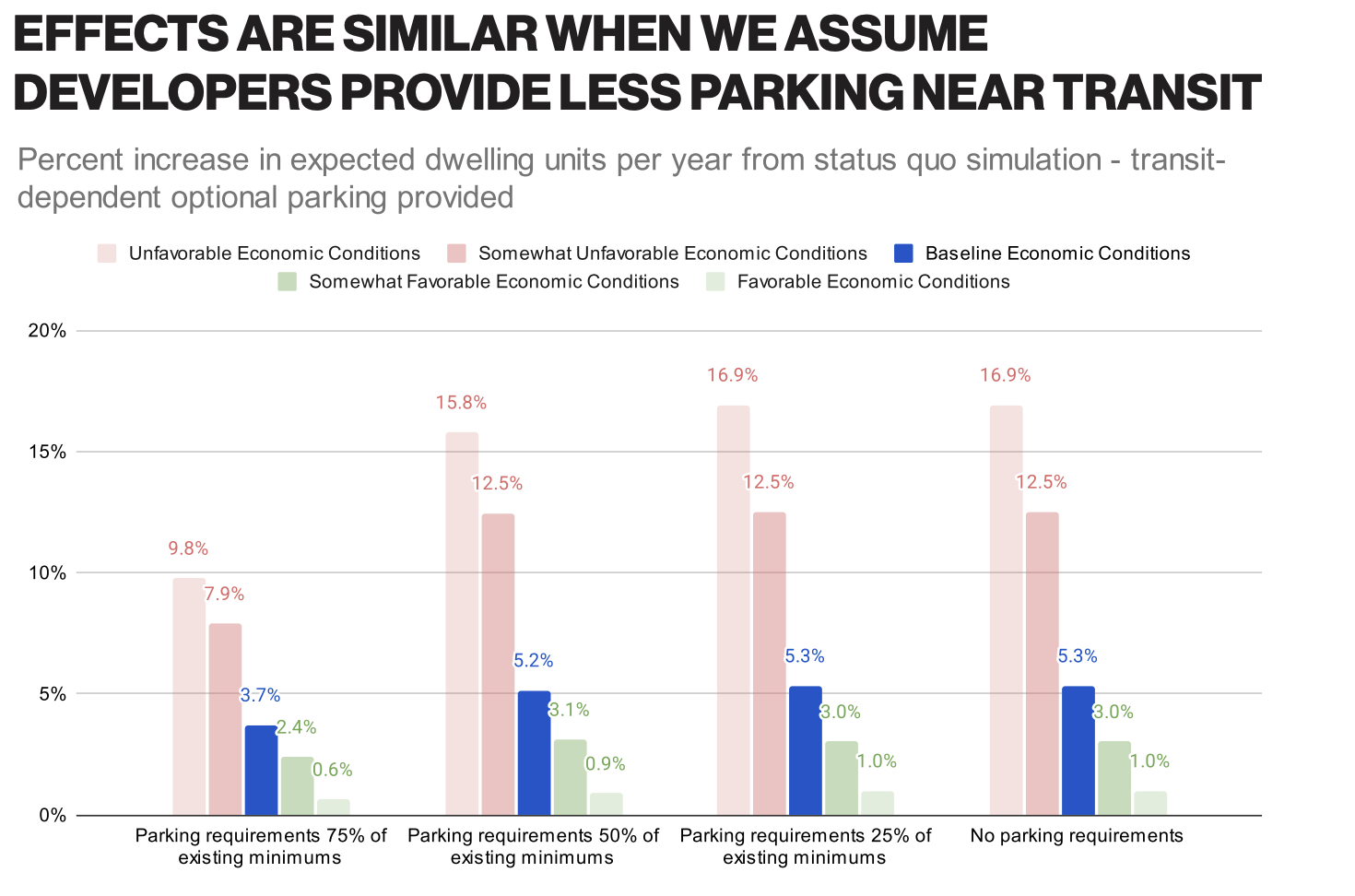Simulator insights help Denver change its parking rules
States and cities across the country are racing to address housing shortages by passing a wide range of pro-housing policies, from upzoning to reducing parking requirements. But a central question remains: What actually works?
Many of these policies are too new for us to assess long-term effectiveness. Whether they succeed often depends on a complex mix of local economic conditions, zoning regulations, and “development math” (the set of calculations developers use to determine if a project is financially viable).
To help policymakers make informed decisions, we built a tool to simulate how these policies are likely to play out under a variety of conditions. The Housing Policy Simulator translates complex datasets into clear, actionable insights, enabling local leaders to test scenarios before implementing real-world reforms.
We piloted the tool in Los Angeles, examining six policy options intended to encourage new housing supply and partnering with the Terner Center to publish a report with our findings. Since then, we’ve built versions of the Simulator for localities around the United States, partnering with UCLA’s Lewis Center for Regional Policy Studies and Arizona State University’s Morrison Institute for Public Policy to explore regional housing policy questions.
This summer, we worked with researchers at the University of Denver to explore a timely issue: the potential impacts of reducing parking requirements for new developments in the city. Cities and states around the country have taken up this question in recent years, theorizing that reduced or eliminated parking requirements could reduce development costs and incentivize additional housing construction. In 2017, Buffalo, New York became the first major city to fully eliminate parking requirements. Others quickly followed suit; as of 2025, 93 cities across the country have passed similar reforms.

In December 2024, the City and County of Denver announced the Modernizing Parking Requirements project, aimed at promoting housing construction by removing minimum parking requirements from development regulations.
For city leaders, identifying effective housing reforms is increasingly urgent. The city’s population has grown nearly 30% since 2005. The average home price has increased by 138%, with lower-income residents shouldering a high cost burden. A 2023 Common Sense Institute report estimated that Denver will need between 31,000 and 49,000 new housing units by 2028 to meet the needs of its population. Could changing a parking requirement make a dent?
To find out, researchers at the University of Denver used our Denver-specific iteration of the Simulator to model outcomes under multiple scenarios and economic conditions, with assumptions developed through extensive discussions with builders, developers, and lenders.
The resulting whitepaper, “Examining Relationships Between Eliminating Parking Minimums and New Housing Construction Using a Terner Housing Simulator Tool,” found that eliminating the mandate could result in an average of up to 460 additional homes per year under certain economic conditions, a 13% increase from the report’s baseline assumption.

The report was cited in August 2025 testimony to the Denver City Council, which subsequently narrowly voted to remove the parking minimums requirement for new development. City staff recognized the report as an important piece of evidence for making the change.
Stefan Chavez-Norgaard, report co-author and assistant professor at the University of Denver’s Josef Korbel School of Global and Public AffairsWhile not a silver bullet, eliminating parking minimums is a low-cost, pro-housing reform with measurable benefits. This simulator can be a powerful planning tool with applications beyond parking policy, such as zoning reform and affordable housing incentives.
There are no quick fixes when it comes to housing reform. Determining what levers to pull is complex, but it doesn’t have to be a guessing game. Denver’s example highlights multi-scenario modeling as an essential source of data for leaders hoping to make effective policy changes.
As we build partnerships with institutions in other cities and states, we are hopeful that the Housing Policy Simulator can offer helpful data to leaders considering permitting requirements, zoning reforms, and other policies.
Header image by Vincent Yuan


